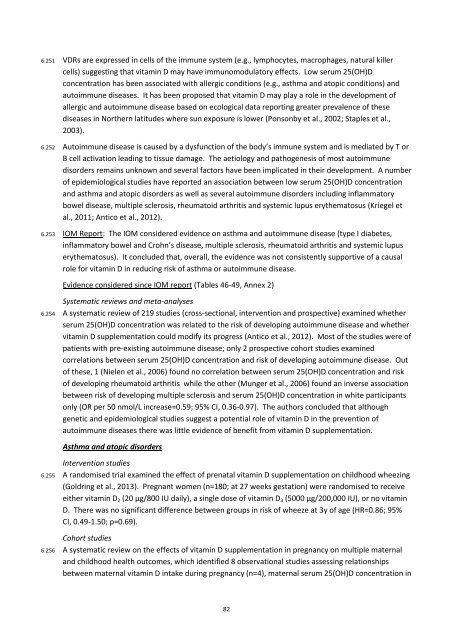Vitamin D and Health
SACN_Vitamin_D_and_Health_report
SACN_Vitamin_D_and_Health_report
You also want an ePaper? Increase the reach of your titles
YUMPU automatically turns print PDFs into web optimized ePapers that Google loves.
6.251 VDRs are expressed in cells of the immune system (e.g., lymphocytes, macrophages, natural killer<br />
cells) suggesting that vitamin D may have immunomodulatory effects. Low serum 25(OH)D<br />
concentration has been associated with allergic conditions (e.g., asthma <strong>and</strong> atopic conditions) <strong>and</strong><br />
autoimmune diseases. It has been proposed that vitamin D may play a role in the development of<br />
allergic <strong>and</strong> autoimmune disease based on ecological data reporting greater prevalence of these<br />
diseases in Northern latitudes where sun exposure is lower (Ponsonby et al., 2002; Staples et al.,<br />
2003).<br />
6.252 Autoimmune disease is caused by a dysfunction of the body’s immune system <strong>and</strong> is mediated by T or<br />
B cell activation leading to tissue damage. The aetiology <strong>and</strong> pathogenesis of most autoimmune<br />
disorders remains unknown <strong>and</strong> several factors have been implicated in their development. A number<br />
of epidemiological studies have reported an association between low serum 25(OH)D concentration<br />
<strong>and</strong> asthma <strong>and</strong> atopic disorders as well as several autoimmune disorders including inflammatory<br />
bowel disease, multiple sclerosis, rheumatoid arthritis <strong>and</strong> systemic lupus erythematosus (Kriegel et<br />
al., 2011; Antico et al., 2012).<br />
6.253 IOM Report: The IOM considered evidence on asthma <strong>and</strong> autoimmune disease (type I diabetes,<br />
inflammatory bowel <strong>and</strong> Crohn’s disease, multiple sclerosis, rheumatoid arthritis <strong>and</strong> systemic lupus<br />
erythematosus). It concluded that, overall, the evidence was not consistently supportive of a causal<br />
role for vitamin D in reducing risk of asthma or autoimmune disease.<br />
Evidence considered since IOM report (Tables 46-49, Annex 2)<br />
Systematic reviews <strong>and</strong> meta-analyses<br />
6.254 A systematic review of 219 studies (cross-sectional, intervention <strong>and</strong> prospective) examined whether<br />
serum 25(OH)D concentration was related to the risk of developing autoimmune disease <strong>and</strong> whether<br />
vitamin D supplementation could modify its progress (Antico et al., 2012). Most of the studies were of<br />
patients with pre-existing autoimmune disease; only 2 prospective cohort studies examined<br />
correlations between serum 25(OH)D concentration <strong>and</strong> risk of developing autoimmune disease. Out<br />
of these, 1 (Nielen et al., 2006) found no correlation between serum 25(OH)D concentration <strong>and</strong> risk<br />
of developing rheumatoid arthritis while the other (Munger et al., 2006) found an inverse association<br />
between risk of developing multiple sclerosis <strong>and</strong> serum 25(OH)D concentration in white participants<br />
only (OR per 50 nmol/L increase=0.59; 95% CI, 0.36-0.97). The authors concluded that although<br />
genetic <strong>and</strong> epidemiological studies suggest a potential role of vitamin D in the prevention of<br />
autoimmune diseases there was little evidence of benefit from vitamin D supplementation.<br />
Asthma <strong>and</strong> atopic disorders<br />
Intervention studies<br />
6.255 A r<strong>and</strong>omised trial examined the effect of prenatal vitamin D supplementation on childhood wheezing<br />
(Goldring et al., 2013). Pregnant women (n=180; at 27 weeks gestation) were r<strong>and</strong>omised to receive<br />
either vitamin D 2 (20 µg/800 IU daily), a single dose of vitamin D 3 (5000 µg/200,000 IU), or no vitamin<br />
D. There was no significant difference between groups in risk of wheeze at 3y of age (HR=0.86; 95%<br />
CI, 0.49-1.50; p=0.69).<br />
Cohort studies<br />
6.256 A systematic review on the effects of vitamin D supplementation in pregnancy on multiple maternal<br />
<strong>and</strong> childhood health outcomes, which identified 8 observational studies assessing relationships<br />
between maternal vitamin D intake during pregnancy (n=4), maternal serum 25(OH)D concentration in<br />
82


